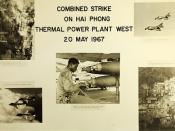"In this war with no front lines on a map, never was intelligence more essential - but seldom has intelligence performed so poorly." Discuss in regard to Vietnam, 1962-72.
Even though the US had some of the finest intelligence services in the world, the disaster at Pearl Harbour on Sunday 7 December 1941 took the Americans completely by surprise even though they were listening to Japan's most secret radio traffic and there were many signs that such attack was possible. But the problem was that the US intelligence services did not read the signs as they should have and this amounted to a complete intelligence failure, and something had to be done urgently to prevent such disaster from happening again and embarrassing, arguably, the world's best intelligence services.
The US acted rapidly and the new intelligence structure they built by 1945 seemed to have the done the trick. And by the 1960s their intelligence capability was very effective, sophisticated, resourced and worldwide.
It may seem that having a lot of agencies that gather enormous amounts of intelligence is a good thing, however, in Vietnam there were many allegations that US intelligence had performed poorly and indeed failed in some situations in the Vietnam War. In this essay, it is intended to examine how true those allegations are by examining the way in which the US intelligence agencies did business in Vietnam, and mainly reference will be given to the Vietcong's Tet Offensive of 1968 which took the world's most technologically advanced army completely by surprise.
Although US intelligence capabilities were something to be truly proud of, it seems that there were problems with the intelligence structure that somehow by passed the minds of its creators and decision makers. The US intelligence services did not have central control, and there were...



Very Good.
Good, although from the North Vietnamese perspective the U.S. was winning the war. A recently published book written by a North Vietnamese general confirms this. I do agree though, we had bad intel, just as in the current war in Iraq.
0 out of 0 people found this comment useful.